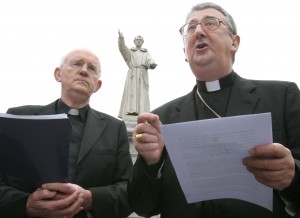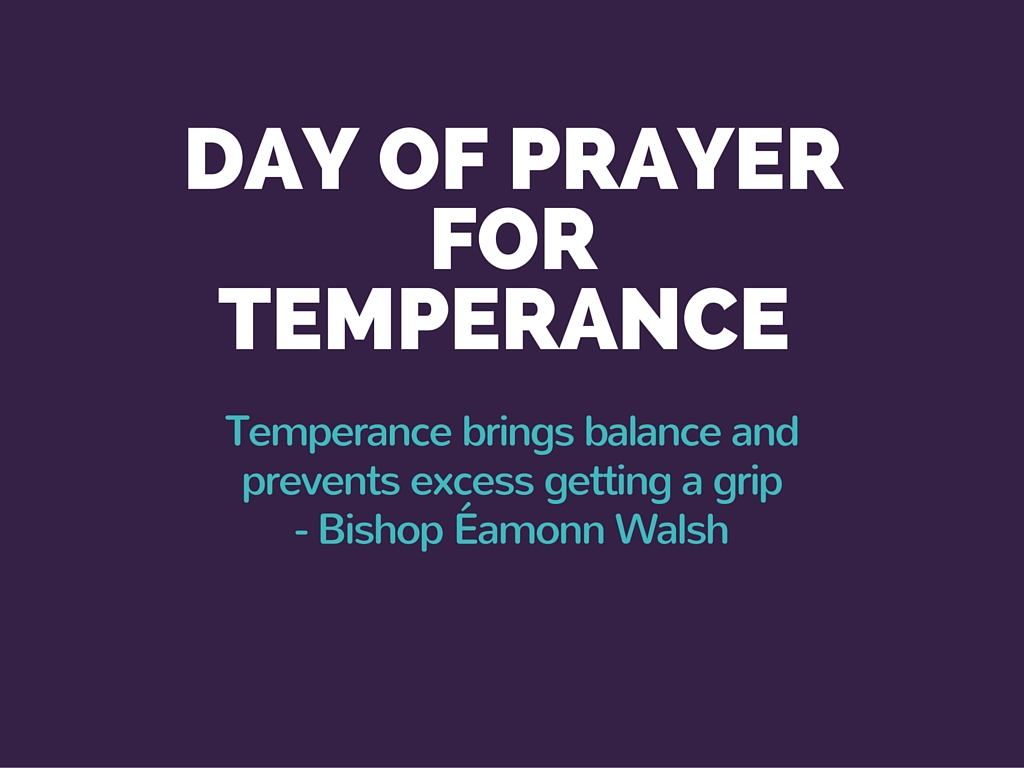Sunday 7 February is a Day of Prayer for Temperance, a day which offers us an opportunity to reflect on our relationship with alcohol and a day on which we can take time to pray for those who suffer from addiction.
Writing about temperance in the current issue of Intercom magazine Bishop Éamonn Walsh, Vice-chair of the Irish Bishops’ Drugs Initiative said:
We live in a world where many people wish to march to the beat of their own drum. Where freedom and tolerance means, ‘let me do what I want and you can do what you want, as long as it does not interfere with my freedom’. When a society takes down the protective banks so that everyone can be totally free, we could easily become a lazy lake with people floating around doing their own thing but really going nowhere. Once there is a focus in life, floating aimlessly disappears. A purpose develops with its own safeguards, priorities and balance. It is this balance that we associate with temperance. It may demand sacrifices to attain a goal for self or others. Once the habit of temperance is formed in one area of life, it can be drawn on whenever required.
Temperance has an unpopular image, it is perceived as a restrictive, a sort of kill-joy and spoil sport. Nothing could be further from the reality. Temperance brings balance and prevents excess getting a grip. Bad tempered behaviour or intemperate language is neither accepted in sport nor in social behaviour. Society is all too aware of how drugs, including alcohol, have done such damage to sport, recreation, working and family life. It has become so difficult for people to resist the culture of artificial and chemical enhancement for all kinds of performances and entertainment.
Bishop Walsh also suggests a concrete way of assisting young people in forming the habit of balance through the Confirmation Commitment. The Confirmation Commitment encourages candidates, with the assistance of their sponsors, to make a commitment to themselves and to others to lead a healthy lifestyle, respect themselves and others, and to use the knowledge about alcohol and drugs to stay safe. The gifts of wisdom, knowledge, right judgement and courage are called on to take, and to keep, their commitment.
Click here for Intercom February 2016 article on Temperance by Bishop Éamonn Walsh
Click here for more resources from the Irish Bishops’ Drugs Initiative website
Parish Resources for Temperance Sunday
- Father Mathew’s Prayer
Apostle of Temperance Father Mathew (1790-1856) was a Capuchin friar from Tipperary whose 19thcentury crusade against the abuse of alcohol gained him the title of “Apostle of Temperance”. Father Mathew’s call to sobriety has relevance to modern Ireland. The cost to the nation by way of, human suffering, abstention from work, criminality and social upheaval is inestimable.
Compassionate Lord and Saviour,
you inspired the Capuchin Friar Theobold Mathew
to show your compassionate face to those addicted
and burdened by the abuse of alcohol or addicted behavior,
and to promote temperance.
May we today, continue to serve our brothers and sisters with love and joy,
And to foster balance, and moderation in our life styles with the help of God.
So, we pray, “here goes in the name of God.”
- Reflections after Communion
One of the following may be used as a reflection after Communion on Temperance Sunday:
1. Archbishop Oscar Romero
It helps now and then to step back and take the long view.
The Kingdom is not only beyond our efforts, it is even beyond our vision.
We accomplish in our lifetime only a tiny fraction of the magnificent
enterprise that is God’s work.
Nothing we do is complete, which is another way of saying that the
Kingdom always lies beyond us.
No statement says all that could be said.
No prayer fully expresses our faith.
No confession brings perfection.
No pastoral visit brings wholeness.
No programme accomplishes the Church’s mission.
No set of goals and objectives includes everything.
This is what we are about:
We plant the seeds that one day will grow.
We water seeds already planted knowing that they hold future promise.
We lay foundations that will need further development.
We provide yeast that produces effects far beyond our capabilities.
We cannot do everything and there is a sense of liberation in realising that.
This enables us to do something and to do it very well.
It may be incomplete, but it is a beginning, a step along the way –
an opportunity for the Lord’s grace to enter and do the rest.
We may never see the end results, but that is the difference between
the master builder and the workers.
We are workers, not master builders, – ministers, not messiahs.
We are prophets of a future not our own.
2. Alcohol: The Challenge of Moderation
Alcohol confronts us with our own frailty and weakness. Even those who are not
addicted need the support of a higher power in the journey through life if we
are to avoid the perils of addiction. We need the support of friends, of family
and of God. Indeed, there may be people around us who need our support. The
love and support of God is mediated through people just like us when we reach
out to others, bringing God’s love and care into our world.
(Pastoral Letter from the Irish Catholic Bishops’ Conference)

Bishop Éamonn Walsh and Archbishop Diarmuid Martin at the Father Mathew statue in Dublin City Centre.
3. An tAlcól: Dúshlán na Measarthachta
Tá plaic crochta ar an mballa in a lán de na hionaid a chuireann cóir ar andúilithe,
agus scríofa air tá: ‘Is tusa amháin atá in ann é a dhéanamh ach ní féidir leat é
a dhéanamh i d’aonar’. Cuireann sé seo i gcuimhne dúinn go gcaithfidh muid glacadh
leis nach bhfuil ár neart tola uilechumhachtach agus cé ‘go bhfuil an Spiorad
toilteanach, tá an corp lag’ (Maitiú 26:41). Cuireann sé i gcuimhne dúinn freisin
go gcaithfidh muid cúnamh a iarraidh ar Dhia agus ar a chéile má tá muid ag
iarraidh alcól agus na bronntannaisí eile a fuaireamar ó Dhia a úsáid go measartha.
Freisin, tá sé ag cur i gcuimhne dúinn go bhféadfadh sé gur ‘muide’ an crann taca
a theastaíonn ó dhaoine agus iad ar thóir tacaíocht ón AA nó ó ionaid leighis nó
ó chomhairleoir. B’fhéidir nach mbeadh an t-am, an fhuinneamh ná an scil againn
chun cabhrú leo ach b’fhéidir go mbeadh sé ar ár gcumas iad a threorú dtreo an
chúnaimh a theastaíonn uathu.
(Tréadlitir ó Chomhdháil na nEaspag Éireannach)
4. A Íosa a Aonmhic an Athar
A Íosa a Aon-Mhic an Athar ‘s a Uain,
Thug fíorfhuil do chroí ghil dár gceannach go crua,
Bí’m dhíonsa, bí’m choimhdeacht, bí’m aice gach uair,
Más luí dom, más suí dom, más seasamh, más suan.
Ó ísligh mo dhíoltas is m’fhearg is m’fhuath,
Is díbir na smaointe mallaithe uaim;
Lig braon beag ded’ NaoimhSpiorad beannaithe ‘nuas,
A scaoilfeas an croí seo’tá ‘na charraig le cruas.
Tabhair tionscnamh dom ghníomhartha i d’ainm go buan,
Is críochnaigh le fíorcheart de ghnáth mo uaill,
Go bhfaighinnse teacht saor ó gach cealg is cluain,
A RíMhic, ‘s go Bhfaighinnse bheith ag amharc ort suas.
(Cathal Buí Mac Giolla Ghunna)


